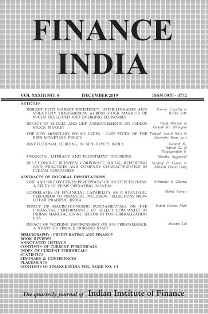As per one of the study published in the recent issue of Finance India – Quarterly Journal of Finance, Vol. 33, No. 4 titled “Financial Literacy and Investment Decisions” by Monika Aggarwal, Assistant Professor in Commerce, Post Graduate Government College, Chandigarh, attempts to better understand financial literacy and its relation to financial decision making and investments in financial market instruments (stocks, bonds and mutual funds). In terms of policy implications, the findings of the study suggest that financial literacy differs substantially depending on education, age, occupation and gender. Basic financial literacy is widespread according to the sample of study, but advance financial literacy relating to knowledge of stocks, bonds and diversification needs to be improved. One way to decrease the gender gap in stock market participation may be to increase numeracy skills, i.e. raise basic financial literacy, among women as there is link between financial literacy and economic decision making. Financial education programs can be designed to target the needs of specific group of people. Personal finance plays an important role in enhancing the quality of life, so the policy makers must take effective measures to improve people knowledge, which in turn will increase participation in the stock market.
The study finds that the majority of respondents display basic financial knowledge and have some grasp of concepts such as interest compounding, inflation, and the time value of money. However, very few go beyond these basic concepts; many respondents do not know the difference between bonds and stocks, the relationship between bond prices and interest rates.
Individuals in high and average financial literacy are more likely to invest in PPF, Mutual Fund and infrabonds as there awareness level about these products is high and these instruments are good tax reduction options. Better qualfied people and higher family income prefer to invest in ULIPs. Higher financial literate are more likely to have investment in stocks, insurance, Mutual funds, PPF, LIC and infrastructure bonds. Younger people and people with commerce background are more likely to invest more in shares. Investment in shares is found statistically significant with age,education and marital status. That woman is generally less financially knowledgeable than men. However, even the large majority of people with university degree do not participate in the stock market. People shy away from participating in stock markets as there is volatality and less awareness about investor protection measures.






